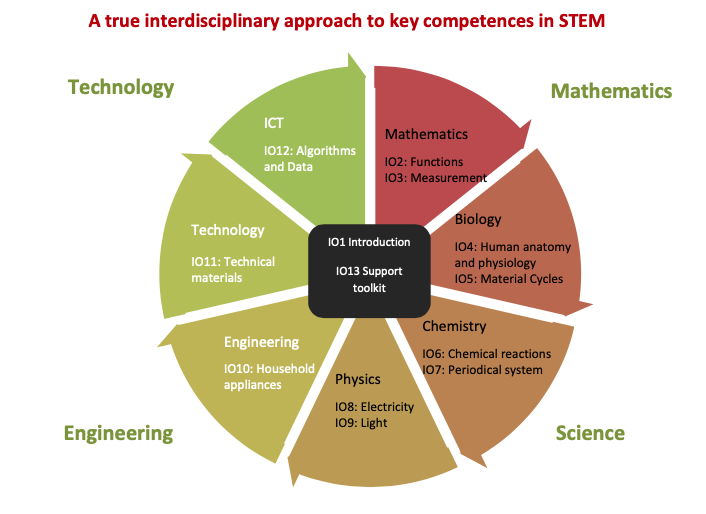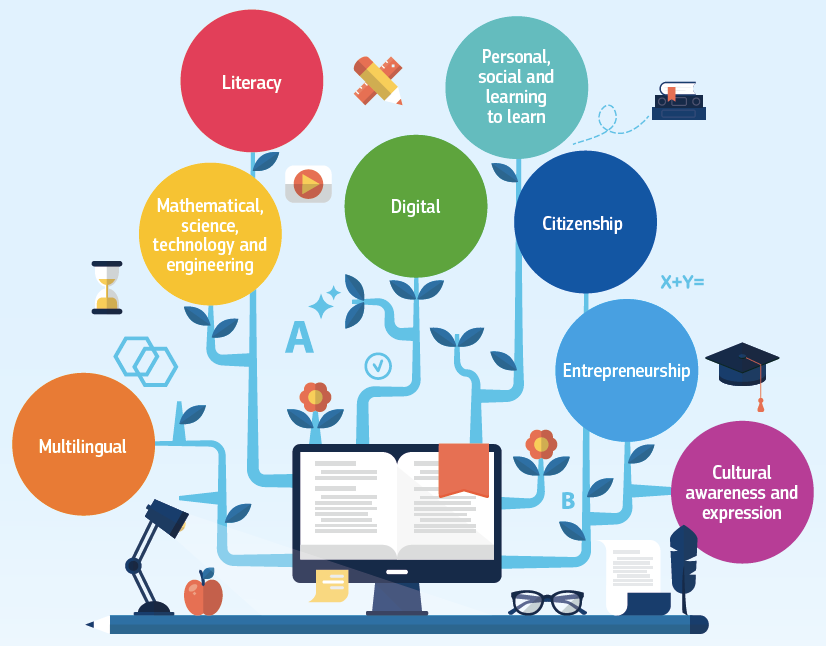STEMkey – Competenties & standaard-STEM-onderwerpen
september 2020 – september 2023
Europese website (STEMkey) met opbrengsten


Modules
Zie verder het overzicht op icse.eu/international-projects/stemkey (downloads)
Bericht september 2021
Dit Erasmus+ project is in 2020 van start gegaan en focust op het creëren van een heldere verbinding van ‘sleutelcompetenties’ met onderliggende ‘basisvaardigheden’. Dit wordt gedaan voor enkele belangrijke centrale begrippen/concepten uit de bèta-vakken, zoals te zien is in het overzicht hieronder ‘intellectual outputs’.
Een en ander resulteert in modules voor de lerarenopleiding(en).
Inmiddels is er een eerste (voorlopige) versie van de module beschikbaar.
Aanleiding
In het document Key competences for lifelong learning (EU, 2018) worden essentiële competenties voor iedereen beschreven (zie de competentiegebieden in het plaatje hierboven).
Het project STEMkey wil voor het competentie-gebied STEM een vertaalslag maken naar ‘en wat moet je dan eigenlijk kennen en kunnen?’.
Ontwikkeling van modules voor de lerarenopleiding STEM
 |
Er zullen modules ontwikkeld worden voor de lerarenopleiding.Partners: Duitsland, Nederland, Oostenrijk, Noorwegen, Tsjechië, Turkije, Litouwen, Cyprus |
De modules en de instellingen:
| Lead | Intellectual outputs | DE – ICSE | O1 Introduction: Linking standard STEM topics to key competences | HR – UZA | O2 Functions (Mathematics) | NL – UU | O3 Measurement (Mathematics) | SL – UMA | O4 Human anatomy and physiology (Biology) | AT – UIBK | O5 Material cycles (Biology) | CZ – CUNI | O6 Chemical reactions (Chemistry) | NO – NTNU | O7 Periodical system (Chemistry) | PO – ULIS | O8 Electricity (Physics) | CX – UNIC | O9 Light (Physics) | TR – HU | O10 Household appliances (Engineering) | SK – CPU | O11 Technical materials (Technology) | LT – VU | O12 Algorithms and Data (IT) | DE – ICSE | O13 Support Toolkit |
- Acquiring the concept of a function on various levels of formalism and abstraction
- Dealing with different representations of functions [conversion between words, tables, graphs and formulas]
- Functions and other concepts in mathematics (sequences, equations, inequalities, geometry)
- Functions in real world – modelling with functions
The Measurement Module provides a foundation for future teachers on measurement, quantities and dimensions. Measurement is a standard topic of mathematics curricula across Europe. Measurement provides answers about sizes of objects or phenomena and applies to basic physical quantities like length, area, volume, weight, time, speed, force and energy (Van den Heuvel-Panhuizen & Buys, 2008). These quantities can be primary (e.g. length and time) or compound quantities (e.g. speed defined as distance divided by time). Measurement in daily life involves using various instruments with different measuring scales (e.g. rulers, balance, measuring cups).
The focus of the module is to teach future teachers how to develop the ability to use and apply measurement-related strategies and understanding in order to solve problems in everyday situations by building on a sound mastery of quantities, their dimensions and personal reference measures.
| 1 | Generating and using personal reference measures |
| 2 | Schematizing |
| 3 | Identifying quantities and using measuring tools |
| 4 | Language to communicate about measurement |
NEEDS & CONTEXT
In line with the European Education Area initiatives, the European Commission has identified the urgent need to support the development of its citizens’ key competences (COM2019a). When it comes to education, higher education institutions (HEI) play a major role, as they are the ones to educate future teachers.
Our proposal focusses on two of the eight key competences, namely competence in mathematics, science, technology and engineering, as well as digital competence. Core of STEM education at school is the transfer of fundamental subject knowledge like functions, electricity and chemical reactions. Learners’ skills and attitudes have not been sufficiently nurtured likewise in traditional standard ways of STEM teaching (Maass, Geiger, Romero & Goos 2019). The Recommendations of the European Council on lifelong learning (Council of the European Union, 2018) however, describe knowledge, skills and attitudes as the three elements of a key competence. Consequently, HEI have to empower future STEM teachers to teach fundamental STEM topics without neglecting skills and attitudes of their future students at school.
For topics bearing controversial aspects or obvious societal relevance – such as environmental degradation or cybersecurity – innovative educational approaches, which enable teachers to not only deliver knowledge but also foster learners’ skills and attitudes, suggest itself. This is much less the case when thinking of chemical reactions, functions or anatomy. The relevance for their lives or society are not obvious to most learners. However, as the acquisition of basic subject knowledge is a vital prerequisite for acquiring related key competences and forms a major part of STEM education, it is imperative to figure out ways how to allow learners to develop key competences in the scope of these seemingly “boring”
topics. Unfortunately, there is only little materials available on teaching basic STEM content and the potential to foster the development of key competences in one go.
OBJECTIVES
Our general objective is to transform future teachers’ grasp of teaching standard STEM topics. To achieve that we will rethink and reshape the delivery of fundamental STEM subject knowledge in the context of key competence development. Future teachers need to be encouraged to refrain from teaching with the sole purpose to transfer knowledge about a single STEM subject, isolated from other STEM subjects. This simply does not live up to todays and tomorrows challenges anymore. They need to understand the relation between knowledge, skills and attitudes, how they affect each other and how they have an effect on their students’ learning experience and personal life. They also need to understand that the STEM subjects are linked to each other and that a forward-looking approach to STEM teaching needs to connect STEM subjects interdisciplinary.
We therefore will empower future teachers to nurture their students’ key competences when delivering standard STEM content. To achieve this objective we will develop teaching modules to be used in HE programmes for future STEM teachers which transform future STEM teachers’ teaching abilities as described above.
TARGET GROUPS
The proposal addresses the following main target groups:
1.Future STEM teachers (students in ITE programmes)
2.Higher education teaching staff involved in STEM ITE
3.Higher education staff responsible for STEM curricula and course progammes
We concentrate on future teachers as they, after graduating, reach out to many future generations of students at school and can thus function as multipliers.
The highest impact will be achieved for HEI within our Consortium, where we pilot our outputs and implement the planned modules permanently in existing course programmes.
Additionally, we will also reach the same groups beyond partner institutions and countries through various communication, dissemination and exploitation measures.
- (2018). Handreiking brede vaardigheden, voor ontwikkelteams en ontwikkelscholen Curriculum.nu (PDF) (pp. 48). Amersfoort: SLO.
- (2020). Leergebied Rekenen & Wiskunde. Voorstel voor de basis van de herziening van de kerndoelen en eindtermen van de leraren en schoolleiders uit het ontwikkelteam Rekenen &
Wiskunde. (PDF). Enschede: Curriculum.nu/SLO. - (2020). Leergebied Digitale Geletterdheid. Voorstel voor de basis van de herziening van de kerndoelen en eindtermen van de leraren en schoolleiders uit het ontwikkelteam Digitale geletterdheid (PDF). Enschede: Curriculum.nu/SLO.
- (2020). Digitale Geletterdheid. Toelichting op het voorstel voor de basis van de herziening van de kerndoelen en eindtermen van de leraren en schoolleiders uit het ontwikkelteam Digitale Geletterdheid (PDF). Enschede: Curriculum.nu/SLO.
- (2020). Rekenen & Wiskunde. Toelichting op het voorstel voor de basis van de herziening van de kerndoelen en eindtermen van de leraren en schoolleiders uit het ontwikkelteam Rekenen & Wiskunde (PDF). Enschede: Curriculum.nu/SLO.
- Ballering, F. (2012). Het metriek stelsel; Eerst begrip, dan de formule (PDF) Volgens Bartjens, 31(Special vo/mbo 2)
- Burger, W. and Shaughnessy, J. (1986). Characterizing the van Hiele Levels of Development in Geometry Journal for Research in Mathematics Education, 17, 31–48
- Cairns, D. and Areepattamannil, S. (2019). Exploring the Relations of Inquiry-Based Teaching to Science Achievement and Dispositions in 54 Countries Research in Science Education, 49(1). 10.1007/s11165-017-9639-x
- Doorman, L. M. (2019). Contexts to Make Mathematics Accessible and Relevant for Students—Jan de Lange’s Contributions to Realistic Mathematics Education In W. Blum, M. Artigue, M. A. Mariotti, R. Sträßer and M. Van den Heuvel-Panhuizen (Eds.), European Traditions in Didactics of Mathematics (pp. 73–78).
- Gravemeijer, K. (1999). How emergent models may foster the constitution of formal mathematics Mathematical Thinking and Learning, 1(2), 155-177
- Navracsics, T. (2018). Key competences for lifelong learning (PDF). Brussel: European Union.
- Van den Heuvel-Panhuizen, M. and Buys, K. (Eds.). (2003). TAL – Jonge kinderen leren meten en meetkunde (PDF). Groningen: Wolters Noordhoff.
- Wijers, M. and Jonker, V. (2017). Authentic contexts in mathematics textbooks in secondary pre-vocational education (VMBO) (PDF). In B. Grevholm (Ed.), Mathematics textboos, their content, use and influences. Research in Nordic and Baltic countries (pp. 245-268). Oslo: Cappelen Damm Akademisk.




